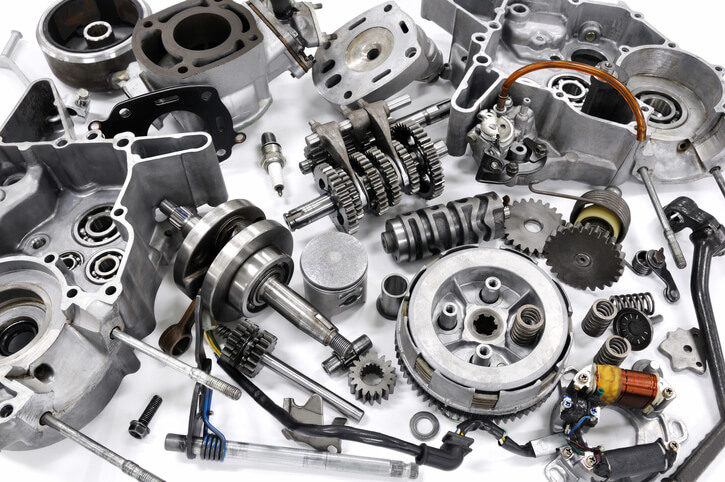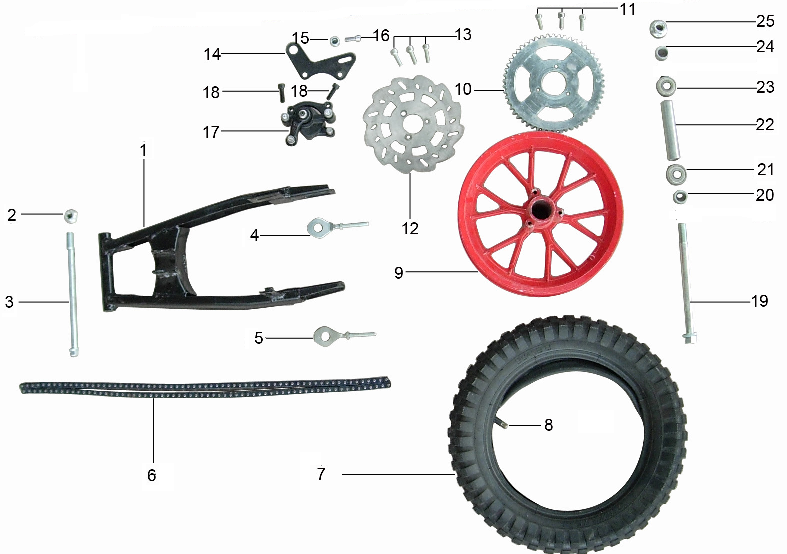Why Regular Checks on Motorcycle Spares Christchurch Save You Money
Discover the Vital Motorcycle Parts You Need for Optimal Efficiency
Understanding the vital parts of a motorcycle is fundamental for achieving peak efficiency. Each element, from the engine to the stopping system, plays an essential duty in overall performance and security. Normal maintenance can prevent unforeseen failings and enhance the riding experience. Several bikers forget the details of these systems. Discovering how they function with each other can cause a more reliable ride. What vital elements should every cyclist prioritize?
The Engine: The Heart of Your Motorbike
The engine functions as the core component of a bike, driving its efficiency and specifying its capacities. It is accountable for converting gas into power, which powers the bike onward. Numerous kinds of engines are employed, including single-cylinder, V-twin, and inline setups, each offering distinctive features matched for different riding styles and purposes. The engine dimension, commonly measured in cubic centimeters (cc), substantially influences performance, with larger engines normally supplying even more power and torque.Furthermore, the engine's style and modern technology, such as fuel injection systems or air-cooling versus liquid-cooling, influence efficiency and dependability. Maintenance is necessary for peak operation; factors like routine oil changes and monitoring ignition system assurance longevity. Bikers typically think about an engine's responsiveness and level of smoothness, as these features enhance the overall riding experience. Eventually, the engine stays an essential aspect that defines not only the bike's efficiency yet also the biker's link to the machine.
The Transmission: Moving Gears Efficiently
The transmission plays an important duty in a motorbike's performance, especially in the technicians of gear moving. Understanding just how to shift equipments smoothly can enhance the overall riding experience, while regular upkeep guarantees peak functionality. Proper attention to these facets can greatly influence the longevity and performance of the motorbike.

Equipment Shifting Mechanics
Smooth gear shifting is essential for excellent motorbike efficiency, significantly influencing both velocity and control. The auto mechanics of gear shifting involve the interaction between the clutch, equipment lever, and transmission system. When a rider engages the clutch, it disengages the engine from the transmission, allowing for an equipment modification without harming the components. A well-timed launch of the clutch, combined with exact movement of the equipment bar, assists in a smooth modification in between equipments. This process guarantees that the engine runs within its ideal power band, improving efficiency. Bike Parts Wellington. Additionally, understanding the equipment ratios and their impact on speed and torque can assist bikers make notified choices throughout shifts, eventually adding to an extra receptive and pleasurable riding experience
Maintenance Tips Relevance
Routine maintenance plays a necessary function in guaranteeing that the transmission system operates efficiently, enabling for smooth equipment changes. Consistently changing the transmission and checking fluid is vital, as old liquid can cause enhanced friction and wear. In addition, evaluating the clutch for wear guarantees peak engagement and disengagement, avoiding slippage during gear changes. Lubrication of relocating components is equally vital to minimize friction and improve performance. Motorcycle proprietors must likewise check for leakages and unusual sounds, as these can suggest underlying issues. By sticking to these upkeep suggestions, cyclists can lengthen the life-span of their transmission system, assuring that equipment changes stay smooth and contributing to the overall efficiency of their motorcycle.
The Braking System: Ensuring Safety And Security on Every Trip
Braking systems are basic elements that straight influence a motorcycle's safety and efficiency. They contain numerous components, consisting of brake pads, rotors, calipers, and hydraulic lines, all collaborating to guarantee effective slowdown. The kind of braking system-- usually either disc or drum-- influences responsiveness and quiting power.Regular maintenance is important to promote peak efficiency; used brake pads can bring about lowered efficiency and increased quiting distances. In addition, the high quality of brake liquid need to be monitored, as it can take in dampness in time, jeopardizing stopping efficiency.Riders need to also take into consideration the value of anti-lock braking systems (ABDOMINAL MUSCLE), which protect against wheel lockup during sudden stops, enhancing general safety. Appropriately working brakes are not nearly stopping; they impart self-confidence in the biker, enabling more secure navigation via different surfaces. Ultimately, a trustworthy stopping system is important for enjoying every ride with satisfaction.
The Suspension: Enhancing Comfort and Control
A well-functioning suspension system considerably adds to a motorbike's general efficiency, complementing the performance of the braking system. The suspension plays a substantial function in absorbing shocks from irregular surfaces, guaranteeing a smoother trip while keeping tire contact with the road. This call is essential for both stability and control, permitting riders to browse corners with self-confidence and precision.Different kinds of suspension systems, such as telescopic forks or mono-shocks, offer varying levels of comfort and handling. Properly tuned suspension improves responsiveness, providing the biker with a more connected feel to the motorcycle. Routine maintenance checks are very important to identify the suspension elements, consisting of dampers and springtimes, are operating at their ideal. An effective shock absorber not only elevates the riding experience however likewise adds to the longevity of other motorcycle components by lessening damage. Because of this, purchasing high quality suspension is vital for any kind of significant motorbike lover.
The Tires: Attaching You to the Roadway
Tires play a necessary duty in a motorbike's efficiency, working as the primary web link in between the roadway and the motorcyclist. Comprehending the various kinds of tires available can significantly affect taking care of and security. Additionally, regular maintenance is crucial to guarantee peak tire performance and durability.
Tire Keys In Explained
How do different tire kinds affect a motorbike's performance? Tire types play an important duty in determining a motorcycle's stability, hold, and handling. Sporting activity tires, designed for high performance, deal enhanced grip and responsiveness on paved roads, making them perfect for competing and aggressive riding. Alternatively, visiting tires prioritize toughness and convenience, providing a smoother adventure for long-distance travel. Off-road tires, defined by their sturdy browse around this site walk patterns, excel in grip on unpaved surfaces, appropriate for journey fanatics. Additionally, dual-sport tires mix qualities from both off-road and on-road categories, dealing with flexible riding requirements. Inevitably, picking the best tire type is essential for optimizing efficiency, making sure safety, and enhancing the total riding experience.
Maintenance Tips Offered
While riding on the road, keeping optimal tire condition is important for safety and efficiency. Consistently inspecting tire pressure is very important, as under-inflated tires can bring about poor handling and increased wear. It is suggested to examine walk depth frequently; worn tires concession grip and stability. In addition, riders must look for indicators of damage, such as cracks or lumps, which can suggest the requirement for substitute. Rotating tires regularly guarantees even wear, boosting longevity. Furthermore, maintaining tires clean from particles and staying clear of too much aesthetics can lengthen their lifespan. Keeping correct alignment and balance adds to come to a head efficiency, lessening stress on various other bike parts. Sticking to these maintenance tips will considerably boost the total riding experience.
The Fuel System: Sustaining Performance and Performance
The fuel system plays an important role in taking full advantage of a motorbike's performance and performance, as it assures the optimal distribution of fuel to the engine. It comprises a number of important parts, including the fuel storage tank, gas pump, gas filter, and gas injectors or carburetor. Each component needs to function properly to guarantee a powerful and smooth ride.The fuel tank stores fuel and supplies it to the engine by means of the fuel pump, which generates the necessary pressure. A gas filter stops impurities from going into the engine, while the injectors or carburetor mix gas with air for combustion.Proper maintenance of the fuel system is crucial; a blocked filter or malfunctioning injector can lead to reduced efficiency and increased fuel consumption. By validating that the gas system see this runs effectively, cyclists can enjoy enhanced throttle response, far better gas economic climate, and generally improved riding experience.
The Electrical System: Powering Your Trip
A reliable electric system is necessary for the overall capability and security of a motorcycle, as it powers vital parts such as the ignition, lights, and various electronic systems. This system consists of the battery, which shops energy, and the alternator, accountable for generating power while the engine runs. The electrical wiring harness connects these elements, making sure trusted power distribution.Additionally, fuses shield the system from overloads, while relays help manage high-current gadgets with low-power signals. A well-kept electric system enhances efficiency by making sure smooth begins and consistent operation of lights and signals, essential for cyclist exposure and safety.Regular checks of the battery's charge and links are essential for protecting against electric failures. Cyclists ought to likewise examine circuitry for wear and tear, guaranteeing all parts operate ideally. Ultimately, a durable electrical system contributes substantially to the total performance and dependability of the motorbike.
Regularly Asked Questions
How Often Should I Change My Motorbike's Battery?
The frequency of bike battery substitute depends upon usage and upkeep (Motorcycle Parts Auckland). Generally, batteries must be replaced every three to 5 years. Routine checks can aid identify when company website a replacement is necessary for peak performance
What Tools Do I Required for Standard Motorcycle Maintenance?
For fundamental motorbike maintenance, one requires essential tools such as a socket set, wrenches, screwdrivers, pliers, tire stress scale, and a torque wrench. These devices assist in reliable maintenance and assure the bike runs efficiently and securely.
Exactly How Can I Improve My Bike's Aerodynamics?
To boost bike the rules of aerodynamics, one must take into consideration readjusting fairings, making use of windscreen extensions, enhancing body placement, and minimizing general weight. These alterations assist lessen drag, improving security and gas efficiency during rides.
What Are the Indications of a Failing Electrical System?
Indications of a stopping working electrical system consist of lowering lights, problem starting, irregular tool readings, and blown merges. Motorcycle Parts Auckland. Uncommon scents or rust around battery terminals might likewise suggest underlying concerns requiring prompt interest for security and performance

How Do I Pick the Right Oil for My Bike?
When selecting oil for a motorcycle, one ought to consider the maker's requirements, viscosity rankings, and the type of riding. In addition, conventional versus artificial oil can affect performance and engine protection, influencing the choice substantially. The engine size, usually determined in cubic centimeters (cc), substantially affects performance, with bigger engines generally offering even more power and torque.Furthermore, the engine's style and modern technology, such as fuel shot systems or air-cooling versus liquid-cooling, affect effectiveness and integrity. A well-functioning suspension system considerably contributes to a motorcycle's overall efficiency, enhancing the efficiency of the stopping system. The fuel system plays an important role in taking full advantage of a motorbike's efficiency and performance, as it assures the optimum delivery of fuel to the engine. A fuel filter stops pollutants from going into the engine, while the injectors or carburetor mix gas with air for combustion.Proper maintenance of the gas system is important; a blocked filter or malfunctioning injector can lead to lowered performance and enhanced gas intake. A well-kept electric system enhances efficiency by making certain smooth begins and regular procedure of lights and signals, vital for cyclist visibility and safety.Regular checks of the battery's cost and links are essential for avoiding electrical failings.